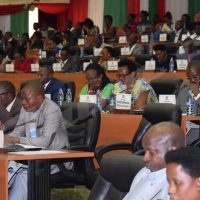
A maize field struck by drought
The Food and Agriculture Organisation (FAO) has started distributing agricultural inputs to 31,000 households of farmers threatened by climate change. The inputs include bean and vegetable seeds, chemical fertilizers, sweet potato cuttings and, in some cases, hoes for the 2017 second growing season.
Burundi is under an alarmingly growing threat of climate change. Irregular rain, drought, and plant diseases due to climate change come to “worsen chronic food and nutrition insecurity”, according to FAO. Severe and moderate malnutrition affects 50% of the population in Burundi.
Apollinaire Masuguru, Programme Officer for FAO- Burundi, says the objective of the distribution of those inputs is to “build climate change resilience” for most vulnerable farmers.
The agricultural inputs supply is the implementation of two EU projects, one UN project via OCHA and one of the French cooperation funds.
The projects target provinces that have been determined to be the most vulnerable. Masuguru says the two EU projects cover 9,000 households in the provinces of Karuzi, Kirundo, Muyinga in the North of Burundi, and Makamba and Rutana in the South.
The first project started in 2016 and is still ongoing. It covers 4,000 households. The second project covers 5,000 households for the 2017 second growing season starting with February. Ten rural districts of the five provinces are covered. In every district, 500 households receive the assistance.
The UN project, CERF (Central Emergency Response Fund), coordinated by OCHA, covers 20,000 households in the provinces of Muyinga, Bujumbura, Cankuzo and Bubanza.
The assistance provided by the French cooperation funds covers 2,000 households of Cankuzo province.
The assistance in agricultural inputs for the 2017 growing season is expected to help farmers who were seriously affected by climatic vagaries and plant diseases in the last growing season. According to FAO, the farmers might not, otherwise, get seeds for the second growing season starting with February.
Over 90% of Burundians live on farming. Drought and plant pests that destroyed crops in the last growing season were followed by serious hunger that reportedly contributed to the death of a number of people in some of the provinces targeted by the current FAO assistance. Other people have reportedly fled to the neighbouring Democratic Republic of the Congo and Tanzania.



















 IWACU Open Data
IWACU Open Data

